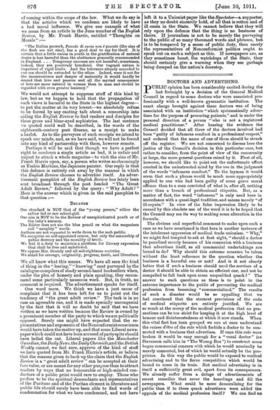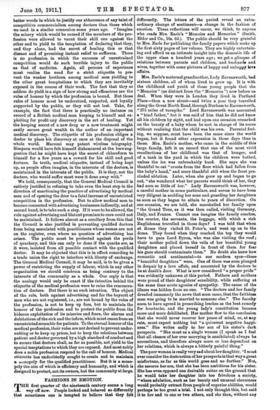DOCTORS AND ADVERTISING. P UBLIC opinion has been considerably excited during
the last fortnight by a decision of the General Medical Council in regard to some doctors who were associated pro- fessionally with a well-known gymnastic institution. The exact charge brought against these doctors was of being associated with an institution "which systematically adver- tises for the purpose of procuring patients," and is under the personal direction of a person "who is not a registered medical practitioner." After hearing the evidence the Council decided that all three of the doctors involved had been "guilty of infamous conduct in a professional respect," and ordered that the name of one of them should be struck off the register. We are not concerned to discuss here the justice of the Council's decision in this particular case, hut rather to consider, from the point of view of the community at large, the more general questions raised by it. First of all, however, we should like to point out the unfortunate effect created in the uninstructed mind by the use in the judgment of the words "infamous conduct." To the layman it would seem that such a phrase would be much more appropriately applied to one who had been guilty of some grave moral offence than to a man convicted of what is, after all, nothing more than a breach of professional etiquette. But, as a matter of fact, the word "infamous" is only used here in accordance with a quasi-legal tradition, and means merely "of ill-repute." In view of the false impression likely to be caused by this obsolete use of the word it is to be hoped that the Council may see its way to making some alteration in the formula.
The obvious and superficial comment to make upon such a case as we have mentioned is that here is another instance of the intolerant oppression of medical trade unionism. "Why," we might feel tempted to ask at first sight, "should a doctor be penalized merely because of his connexion with a business that advertises itself, as all commercial undertakings are bound to do ? Why should this extreme measure be taken without the least reference to the question whether the business is a harmful one or not? And is it not clearly better that if such a business should need the services of a. doctor it should be able to obtain an efficient one, and not be compelled to fall back upon some unqualified quack ? " The answer to such questions as these is to point to the extreme importance to the public of preventing the medical profession from becoming "commercialized." The results of such a. disaster would be so appalling that we feel convinced that the sternest provisions of the code of medical etiquette are entirely justified. We are so much at the mercy of the medical profession that no pre- cautions can be too strict for keeping it at the high level of honour and disinterestedness at which it now stands. When this vital fact has been grasped we can at once understand the raison cr etre of the rule which forbids a doctor to be con- nected with a business that advertises. If once this rule were broken it would be easy enough for a "venal doctor" (as Stevenson calls him in "The Wrong Box ") to construct some bogus commercial concern with which he would nominally be merely connected, but of which he would actually be the pro- prietor. In this way the public would be exposed to medical advertising and to the fierce competition which would be bound to come in its train. But medical advertising is in itself a sufficiently great evil, apart from its consequences. We already suffer from a deluge of advertisements of secret remedies that cover the hoardings and fill the newspapers. What could be more demoralizing for the public than if to these quack advertisers were added the appeals of the medical profession itself? We can find no
better words in which to justify our abhorrence of any taint of competitive commercialism among doctors than those which we used in a similar connexion some years ago. "Imagine the misery which would be caused if the members of the pro- fession were allowed to vaunt their skill one against the other and to yield to the temptation of declaring that they, and they alone, had the secret of healing this or that disease and of promising instant relief to sufferers. There is no profession in which the excesses of unrestrained competition would do such terrible injury to the public as that of medicine. Again, all persons of experience must realize the need for a strict etiquette to pre- vent the weaker brethren among medical men yielding to the other great temptations to which they are inevitably exposed in the course of their work. The fact that they so seldom do yield is a sign of how strong and efficacious are the rules of honour by which the profession is bound. But those rules of honour must be understood, respected, and loyally supported by the public, or they will not last. Take, for example, the fact that there is practically no instance on record of a British medical man keeping to himself and ex- ploiting for profit any discovery in the art of healing. Yet the keeping secret of a new drug or a new treatment might easily secure great wealth to the author of an important medical discovery. The etiquette of his profession obliges a dootor to place his discovery at once at the disposal of the whole world. Marconi may patent wireless telegraphy. Simpson would have felt himself dishonoured at the bare sug- gestion that he might have kept the secret of chloroform to himself for a few years as a reward for his skill and. good fortune. In truth, medical etiquette, instead of being kept up, as people often imagine, in the interests of the doctors, is maintained in the interests of the public. It is they, not the doctors, who would suffer most were it done away with."
We hold, consequently, that the General Medical Council is entirely justified in refusing to take even the least step in the direction of sanctioning the practice of advertising by medical men and of opening the door to a fatal increase of unrestricted competition in the profession. But to allow medical men to become connected with advertising businesses indirectly, and at second band, is to take such a step. If it were to be allowed, the rule against advertising and blatant promises to cure could not be maintained. It follows almost as a corollary from this that the Council is also justified in preventing qualified doctors from being associated with practitioners whose names are not on the register, even where no question of advertising has arisen. The public must be protected against the perils of quackery, and this can only be done if the quacks are, as it were, isolated from all possible contact with the qualified doctor. It may be objected that this is in effect conceding to a trade union the right to interfere with liberty of exchange. The General Medical Council, it may be said, is to be given a power of restricting the supply of labour, which in any other organization we should condemn as being contrary to the interests of the community as a whole. Our reply is that the analogy would only be exact if the intenticra behind the etiquette of the medical profession were to raise the remunera- tion of doctors. But there is no such intention. The object of the rule, both against advertising and for the boycott of men who are not registered, i.e., are not bound by the rules of the profession, is not to keep up fees, but to maintain the honour of the profession and to protect the public from the hideous exploitation of its miseries and fears, the alarms and dubitations of the sick and the infirm, which must ensue from an unrestricted scramble for patients. To the eternal honour of the medical profession, their rules are not devised to prevent under- cutting or to keep up prices, but to keep the relations between patient and doctor governed by a high standard of conduct and to secure that doctors shall, as far as possible, not yield to the special temptations to which they are exposed. And most nobly does a noble profession respond to the call of honour. Medical etiquette has undoubtedly sought to create and to maintain a monopoly for the qualified practitioner. But it is a mono- poly the aim of which is efficiency and humanity, and which is designed to protect, not its owners, but the community at large.











































 Previous page
Previous page